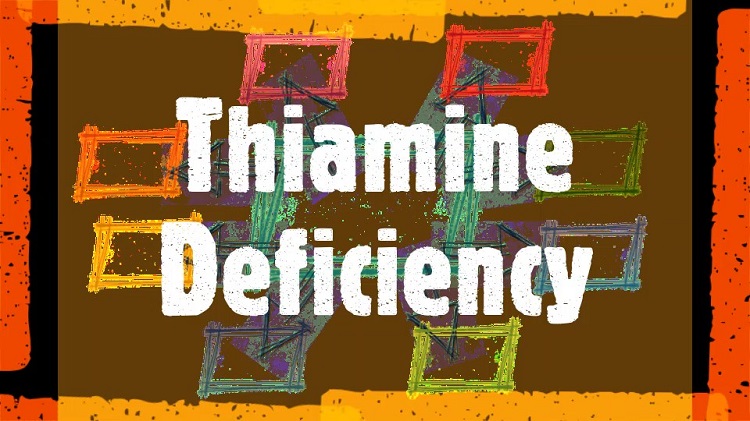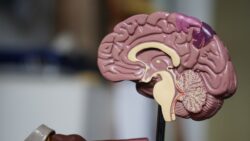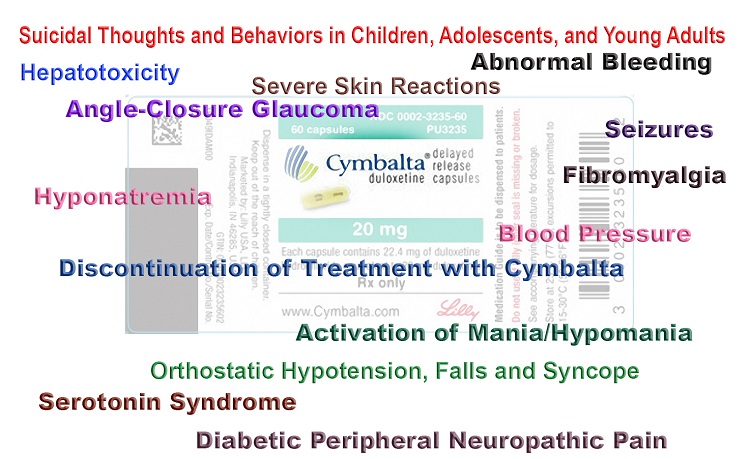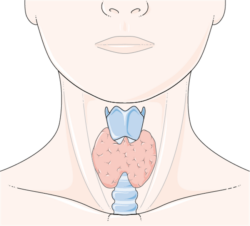Cushing’s Syndrome With a Pituitary Tumor
As a pharmacist, I always believed I had a good handle on most health conditions and the proper steps for diagnosis. It wasn’t until my daughter became very ill in 2014 that I would learn that not all conditions are so simple. After many months of dealing with her mystery illness and through much study, I came upon Cushing’s Disease, which is a condition of excess cortisol production. All of her symptoms seemed to coincide with this disease. She had insomnia, central weight gain, substantial stretch marks, a buffalo hump, flushing, anxiety, difficulty concentrating, muscle weakness, constipation and diarrhea, extreme fatigue and several others. However, her labs were not so clear cut. After two months of rigorous testing and a confirmation of a pituitary tumor on an MRI, she had a diagnosis and a surgery date.
At first, her surgery seemed to be very successful. Her anxiety, flushing, and fatigue went away. Stretch marks stopped appearing and the old ones began to heal. She showed improvement for awhile, and then her health began to decline again. Some of the old symptoms were returning. Then, she developed new symptoms similar to what are seen in the condition referred to as POTS, or postural orthostatic tachycardia syndrome. She had low blood pressure, orthostatic hypotension, temperature dysregulation, and many others. Her pathology report had always troubled me since her surgery and I wondered if the excess cortisol production was actually due to an underlying stress not yet identified.
As I began my journey into functional medicine, I became more aware of the microbiome and what a vital role it can play in our health. I studied small intestinal bacterial overgrowth (SIBO), small intestinal fungal overgrowth (SIFO), and dietary induced vitamin and mineral deficiencies. Each of these areas were clues that I needed in order to put together all the pieces of this incredibly intricate puzzle.
Maybe It Was Thiamine Deficiency
It was not until I came upon a book entitled “Thiamine Deficiency Disease, Dysautonomia, and High Calorie Malnutrition” that all the pieces really started to fall into place. Could a thiamine deficiency be the underlying cause for all of this? I began to wonder if it was not just the surgery that improved her health, but also the IV of vital nutrients that maybe her poor body was unable to absorb. Magnesium is always given prior to brain surgery which activates thiamine into its active form. And, I’m sure her IV nutrition would have contained vitamins such as thiamine. This would have explained some of the improvements we saw that seemed to have no explanation.
We started a regimen of high dose thiamine along with a stronger gut healing protocol for SIBO and SIFO. I wanted to make sure we alleviated any issues that could cause malabsorption of thiamine. Within 3 months on thiamine, my daughter’s lab work improved dramatically. For the first time, she had normal levels of platelets and serum calcium. Also, her cholesterol dropped 35 points and was finally within normal range. Many other markers of concern also showed great improvement. She also had no more symptoms of POTS. Finally, I had found my answer.
I became obsessed on obtaining as much information I could about this deficiency. I researched the mild to severe symptoms and how this nutrient deficiency was prevalent in so many disease states. At this point, I had no idea that this information, which was helping my daughter, would prove to be life-saving knowledge for my grandmother.
Acute Onset Wernicke’s Syndrome In a Hospitalized Elderly Woman
I faced my worst nightmare recently, watching my 90 year old grandmother undergo a descent into severe thiamine deficiency. She has been in the hospital for a bad fall that fractured several ribs and gave her a lung puncture. In addition to the infection from the lung puncture, she had a UTI and then developed pneumonia. All of these factors increased her risk of thiamine deficiency due to the infection, which is clearly stated as a source of thiamine deficiency in the literature.
When I finally made it to the hospital, I could see that she had progressed to Wernicke’s encephalopathy. This was absolutely horrifying. She had severe eye paralysis and it was as if she was looking straight through me. She could not focus her pupils on my face at all. She was able to focus only for one split second and then a tear rolled down her cheek. I literally thought I was going to pass out. I had been studying all the symptoms to look out for in severe thiamine deficiency and now it was staring me in the face. I knew without a shadow of a doubt this was what was wrong, but I wondered “will the doctors listen to me?”
I had asked them several days prior to give her IV thiamine and I was under the impression that they were administering it, but they were only giving her an oral dose of 100 mg daily per the recommendations of one of the physicians. She went into respiratory distress in front of me and I had to agree to let them put her on a ventilator. They wanted to check a thiamine level before giving, and I said that was not always accurate according to studies. I had to beg the nurse practitioner that night to give her something and she agreed to a 100mg injection. I finally saw the doctor the next morning and she agreed to one of the accepted regimens for Wernicke’s Encephalopathy which is 200mg IV three times daily. She agreed that there was no real risk to giving it to her and I was grateful that she trusted my recommendation. I went home and waited for a miracle.
Thankfully, the next day she woke up from this coma-like state. Two days later she was off the ventilator and able to speak with me showing incredible improvement. She has been confused on and off since this incident, but according to studies, this may last for weeks or possibly months. She is 90, so I know this has been very hard on her frail body and her recovery will probably take much longer than a younger person.
Both Chronic and Acute Thiamine Deficiency Go Unnoticed
I hope this was a real wake up call to the staff at the hospital where she is staying. How many other people are suffering from this condition and it goes unnoticed? How many people are dying that could be saved? This is not a rare condition and is certainly not limited to alcoholism. My grandma has not had alcohol in years. She had low thiamine levels going into the hospital, and the infection just pushed her over the edge.
I had prayed for years to determine what could be causing my daughter’s health issues and I believe there was divine intervention that finally led me to thiamine deficiency. To be given this knowledge which is helping to heal my daughter and soon afterward be able to utilize it to save my grandmother’s life is absolutely incredible.
My daughter was suffering from a long term, chronic, mild to moderate thiamine deficiency and my grandmother was experiencing a severe acute deficiency. Both of these can be difficult to diagnose due to the perception that this is a rare condition and typically only affects alcoholics. We need awareness and I am committed to sharing this information with anyone who will listen.
The Progression to Wernicke’s Encephalopathy and Respiratory Distress
We Need Your Help
More people than ever are reading Hormones Matter, a testament to the need for independent voices in health and medicine. We are not funded and accept limited advertising. Unlike many health sites, we don’t force you to purchase a subscription. We believe health information should be open to all. If you read Hormones Matter, like it, please help support it. Contribute now.
Yes, I would like to support Hormones Matter.
This article was published originally on April 30, 2020.
















What Is the best test for B1? I took whole blood and was with in range but I believe I am deficient. Most if my issues started after vaccine, guardasil. I currently have POTS. Please help. Thank you.
Hi Kelly and Dr. Lonsdale. I have been chronically ill for almost 30 years non-stop. I will spare you my 11 page long medical history. I will say that over the years though, that I have been diagnosed with Lyme, mold illness, several autoimmune diseases, a clotting disorder, Dysautonomia, possible MCAS, multiple chronic viral infections, possible Ehlers-Danlos and more. I live with around 55 different symptoms on a daily basis. A person in my local Lyme Facebook group told us about her thiamine deficiency, how she feels she was misdiagnosed with Lyme and how she is making great improvement since being on high dose thiamine. I could not believe how many symptoms I have of it and think this may be my missing piece of the puzzle. Because I am a complicated case, I would feel more comfortable working with a specialist, rather than trying to do this on my own. Dr. Lonsdale, are you taking new patients and if so, do you work remotely? I am in California. If Dr. Lonsdale is unable to work with me, do either of you have a specialist you can refer me to? I have been sick for nearly all my adult life and feel I could finally be close to the miracle I have been praying so long for. Can either of you help me? Thank you so much.
I just found Dr Lonsdale’s Thiamine Deficiency book. My daughter was diagnosed with Cyclical Vomiting syndrome at 1 yr of age…. after beginning to eat solids and after getting the Prevnar shot at 4 months old, She began vomiting every 6 weeks…. like clockwork…gaining a couple days in between episodes as she aged. Her Dr said that while it displayed like CVS, it may have a different cause because she didn’t respond to typical protocol. However, at 16 years old, she was put on Gabapentin and the episodes stopped. We don’t know why this “bandaid” works and I am still on the path of trying to figure this out. In addition, many members of our family have POTS related (Neuro cardio genetic syncope) with positional vertigo. Can this possibly be related to Thiamine deficiency and some genetic predisposition to dysautonomia? Who else should I pose this question to? Is anynoe studying this since Dr Lonsdale’s retirement?
You might also consider L-carnitine and coQ10. This works well to quell cyclic vomiting. We have a few posts on it. The daughter of one of my writers suffered from this as well. The L-carnitine, in particular, is involved the fatty acid metabolism pathway and that seems to be disrupted in CVS and also in hyperemesis gravidarum and other conditions that result in vomiting.
And yes, all of this is also related to thiamine deficiency by one mechanism or another.
Dear Dr. Lonsdale..
I just found out about this thiamine worldwide problem…
I am flabbergasted …. my family and I suffer from SCA3 ( Joseph Macado Diseas ) its a rare progressive nerve degeneratieve diseas and past on generations in our family….
There is no cure….
Several articels I have read, make me wonder ….( I live in the Netherlands) Could it be? ….
Expecially high doses Thiamine…
I have just started my first day 2x1000mg of Thiamine Hcl
Why is this kept silent for so long ?
Thank you from the bottom of my heart.
I hope it will give me some benefits.
Thank you for sharing your wisdom.
With kind regards. Tanja
Hi Tanja, 2x1000mg seems a big start up dosage. It could lead to paradox. Also, Thiamine HCl is not liposoluble. You may want to look into allithiamine as well.
Read this article as well. https://www.hormonesmatter.com/navigating-thiamine-supplements/
Best of luck.
I would like to offer a reason why thiamine deficiency (TD) is associated with so many conditions, that include trauma, infection, surgery and even prolonged worry. They ALL come under the general heading of stress. Stress was defined and researched by Hans Selye at the Stress Institute in Montreal. Selye showed that any form of physical OR mental prolonged stress required the brain to initiate a life preserving, energy (a LOT) consuming, defense mechanism. If and when that energy is consumed, but not replaced, the adaptive, automatically initiated and orchestrated defense mechanism collapses. Thiamine has extremely low storage and its presence DEPENDS on a daily dietary replacement (that is why diet is so important). The lower part of the brain controls ALL the adaptive defense mechanisms through the autonomic nervous and endocrine systems and TD slows it down and can halt it if severe enough. That part of the brain is highly sensitive to TD. That is why KE’s daughter contracted a repeat of her Cushing’s syndrome. The surgery consumed energy and induced TD. It is entirely possible that TD could produce the syndrome on its own but it would be accompanied by symptoms related to other areas of brain orchestration. I had the great pleasure of visiting Selye and he was quite certain that he had solved the problems of human disease and would be the hero of the 21st century. I believe that he was right, but instead he has been forgotten. This is so Important that I feel compelled to write another post on the subject The subject of energy restoration demands an understanding of the synthesis of ATP, so the biochemist should advise the physician.
Are there obvious differences between deficiency-induced disease and already-in-place-and-waiting-to-be-triggered mitochondrial diseases? Or are they the same?
By already in place, I’m speaking about inherited issues, which seem to be more serious? How does one know if they should get genetic testing or not?
Had B1 and B12 symptoms of deficiency, did SCD to heal digestion, but ate too many high oxalic acid foods. Sometimes when I take B1 get histamine reactions, so trying to figure if need a co nutrient (1 nutrition book says B1 needs Mn, B’s, vite C), some people say Mg, B12 (read B12 need iron, vite B2 (read B2 needs Se,I ….).
Had hypotension and low BG symptoms most of life and do wonder why. ( dont have large pupils ) . What has to change as people have been going thru what your family has for years and years!! Training, what insur. co “allow” , what CDC? protocols? Maybe twitter pres and see if helps, so many Dr’s have switched to more human way of practicing. Wish a good test for it , heard C Masterjohn of YT say whole blood (forget which lab co did mention). Am wondering if wifi, EMF (there’s natural earth form and then wireing and appliances effect nutrients.
https://eatbeautiful.net/mcas-histamine-lectin-intolerance-tips/
Dr. Garrett Smith of Nutrition Restored might be able to help you, as he uses a nutritional approach to improve histamine issues. Selenium and magnesium are important, but so are zinc and molybdendum. He explains it all in his nutritional program.
I found out about this website through research for my brother’s Parkinson’s disease and because of researching Dr Paul Mariks protocol which I believe the Lord used to save my mother’s life. She has a history of septic shock following receiving a urostomy.i read about the protocol in 2018 and mentally filed it away. Then last year, my mother became septic again. It’s a long story but I know the protocol saved my mother’s life. It kept her from ending up on a respirator, dying in the intensive care unit, and saved the expense and labor of months in a a rehab unit. Today, My mother is 86 years old, attends to her daily needs, mows her yard, etc. People die but we don’t have to die hooked up to a respirator alone in an intensive care unit. The first Dr in the ICU unit humored me and put her on the protocol, the second Dr was resistant, dismissive,and kind of arrogant but didn’t discontinue it PTL.
Reading your posts these months, Dr Lonsdale has opened my eyes to how pervasive thiamine deficiency is in this country, tracking with obesity, insulin resistance, diabetes empty calories sugar consumption, etc.
I started taking Allithiamine and magnesium because of what you wrote and it cleared up some issues I had so I was thiamine deficient myself and didn’t know it. Thank you, thank you thank you! Dr Lonsdale God bless you!
That is also a remarkable story Susan. I’m so happy the doctors listened to you as well! It sounds as though God was directing your footsteps just as He did mine. And yes, thiamine deficiency is no way to die. It’s a horrible death and thiamine deficiency is a massive problem. I’m glad to hear your mother is doing so well now. God bless!
Kelly has told an extraordinary story. Her perceptiveness and refusal to give up were the two factors that brought her success. The almost total refusal of the medical profession to recognize a series of bizarre symptoms as energy failure is not going to be easy to overcome. Hormones Matter has published many posts, showing the variability and bizarre nature of brain energy deficiency. They could be valuable reading for many people with polysymptomatic disease where they have become “mystery patients” or even written off as psychosomatic.
Thank you so much for your comment Dr. Lonsdale. “Thiamine Deficiency Disease, Dysautonomia, and High Calorie Malnutrition” has been the most eye opening book I have ever read. I share it’s lessons with anyone who will listen. Had this happened a year ago, I would have had no idea what to have done. But, armed with this new information, I was able to save my grandmother’s life. I will continue to spread awareness for thiamine deficiency. Thank you so much!